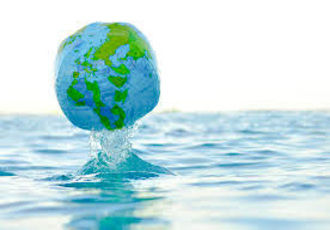You don’t have to look far to see the changes in the world right now. Just step out of your home and you can see how polluted and hot the world has become. Weather systems have intensified as well as natural calamities that hit us with such force each year. There are actually certain parts of the planet that are more prone to experience these disasters than other places. Typhoons, hurricanes, tsunamis, earthquakes, volcanic eruptions, etc., they have all posed a threat to our lives because we can’t really tell when some of them will happen but we can't avoid it either.
 Climate change is especially evident in the ocean. Just head out to sea or just even on beaches and you can see for yourself how global warming has changed people’s lives. Not only certain animal and plant species become extinct as the days go by, island nations are at risk of disappearing off the face of the planet because the sea level is rising as more heat is trapped inside the atmosphere. Consequently, it melts down polar glaciers that make the sea level rise and is now a major global concern because it has become a reality that puts people’s lives at risk.
Climate change is especially evident in the ocean. Just head out to sea or just even on beaches and you can see for yourself how global warming has changed people’s lives. Not only certain animal and plant species become extinct as the days go by, island nations are at risk of disappearing off the face of the planet because the sea level is rising as more heat is trapped inside the atmosphere. Consequently, it melts down polar glaciers that make the sea level rise and is now a major global concern because it has become a reality that puts people’s lives at risk.
Climate change means the sea level is rising, storms are intensifying and seasons are becoming unpredictable. Coral is increasingly torn away from the islands and returned to the lagoon floor. These days, repairing them does little more than delay the inevitable.
Solomon Islands has a population of 560,000 people and a growing number of them are being forced to leave their homes - not just in Lau Lagoon, but also low-lying coastal areas on Malaita, and across the entire atoll, one of the world's largest.It has been more than a decade since the island of Tauba in Lau Lagoon was first submerged completely during a high tide.
(Via: http://www.dw.com/en/climate-change-drives-solomon-islands-people-of-the-sea-ashore/a-40777201)
While most people only think about beaches and paradise islands as dream getaway destinations for a well-deserved vacation, people actually live in many of these places 365 days a year. And as such, they have to brace for everything Mother Nature has in store for them all year round that many tourists rarely get to see because these things mostly happen during off-peak seasons. These locals have survived island life for generations but the complexities and unpredictability of the environment right now are forcing many of them to relocate because living became more of a drag and the risks are greater too.
Temperature records are being broken frequently in Australia, with hot records 12 times more likely to be set than cold ones since 2000, Drs Lewis and King reported in a 2015 paper.
A heatwave last month smashed many records across eastern Australia with more than half the NSW stations with more than 20 years of data registering their hottest September day, the Bureau of Meteorology said.
Under a high carbon emissions scenario, 50-degree days could arrive "as early as the 2040s", Dr Lewis said, adding that even with a concerted reduction in pollution, those temperatures could be reached by about 2060.
Dr King said hospitals, electricity systems and infrastructure would all struggle during such heat spikes.
This problem is no laughing matter as it can spell life or death for many people living in high-risk areas. Imagine living on an island all your life and it suddenly is at risk of submerging in the ocean as the sea level continues to rise. Now, where do you go? Everyone should work hand in hand and change our ways because we only have one planet to live. If we don’t act now and save whatever is left saving, we might have the same ending as previous generations that have long since disappeared because they weren’t a match to the wrath of Mother Nature when it went amock and we only know about them in history books.
How Climate Change Is Shaping The World Today is republished from Keating Economics Blog
source https://www.keatingeconomics.com/how-climate-change-is-shaping-the-world-today/
No comments:
Post a Comment